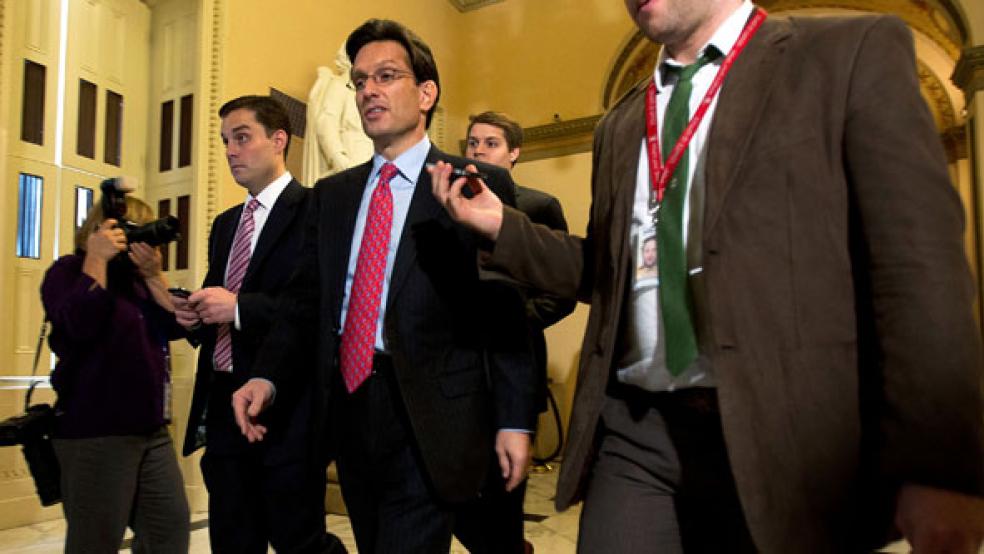The Republican-controlled House just took action that all but assures that a payroll tax cut for 160 million Americans and unemployment insurance benefits for millions more will expire by the end of this month – voting 231 to 187 along party lines to refuse to take up a bipartisan Senate measure that would extend those benefits for another two months.
The Senate bill would have given a badly divided Congress extra time to try to hammer out a deal that would extend the tax and unemployment benefits and avert a sharp reduction in Medicare reimbursements for doctors throughout the coming year. That plan was negotiated by Senate Majority Leader Harry Reid, D-Nev., and Senate Republican Leader Mitch McConnell of Kentucky, and approved last Saturday, 89 to 10.
But after being bludgeoned by Tea Party conservatives over the weekend for seemingly supporting that approach, House Speaker John Boehner, R-Ohio, and other GOP leaders did a swift turnabout and devised a parliamentary strategy to block an up-or-down vote on the Senate plan Tuesday. Instead, Boehner, Majority Leader Eric Cantor, R-Va., and other House leaders are now calling for a Senate-House conference to work out a deal to extend the benefits for a full year. The House will vote on a resolution later today calling for those talks to commence only days before Christmas.
“Our members do not want to just punt and do a two-month, short-term fix where we have to come back and do this again,” Boehner said after a lengthy late-night meeting with his troops on Monday. But House Minority Leader Nancy Pelosi, D-Calif., insisted that the GOP leaders never intended to extend the payroll tax cut or unemployment benefits for middle-income Americans and refused to allow an up-or-down vote on it for fear it might pass.
“Democrats, independents, Republicans want this tax cut,” Pelosi said on the House floor. “In fact, Republicans at 50-something to 30-something support the payroll tax cuts across the country. . . [GOP House leaders] alone are standing in the way of a tax cut for the middle class. . . Let’s understand this is a pattern of House Republicans isolating themselves from the mainstream of even their own party across the country and their colleagues in the Senate – who may or may not like this bill. It isn’t the bill most of us would write, but that’s what a compromise is.”
Pleas by Pelosi, Rep. Louise Slaughter, D-NY., and other House Democratic leaders to allow a vote on the Senate passed bill fell on deaf GOP ears. Freshman Rep. Tim Scott, R-S.C., one of the most prominent Tea Party members, served as GOP floor manager in the debate. Scott said that after the Democrats pushed through major health care reform in 2010 that “raided $500 billion out of Medicare,” they are now asking the middle class to “trust” them with a 60-day extension of a tax cut.
“Regular order suggests that for the past 200 years, when the House and the Senate don’t agree, they go to conference,” he said. “So that that the folks on the left and those fighting for freedom on the right have an opportunity to come together in a conference.”
House GOP leaders will spend the rest of the day arguing for a resumption of the protracted and chaotic negotiations between the House and the Senate over a long-term solution. This would enable Tea Party conservatives in the House like Scott to dictate the terms of a final agreement, while running the very real risk that nothing will be done before the start of the New Year.
"I've never seen us so unified," Rep. Louie Gohmert, R-Texas, said as he left a two-hour, closed-door meeting Monday night where Republicans firmed up their plans, according to the Washington Post. He said the payroll tax cut that has been in effect this year failed to create any jobs, but he favored extending it for another 12 months because "it's tough to raise taxes when you're in a down economy."
Sen. Chuck Schumer of New York, the third ranking Democrat, dismissed the House action today as a ploy to kill the tax cut and unemployment insurance measure. “When you want to kill something but don’t want your fingerprints on it, just send it to a committee,” he told MSNBC.
If the tax holiday is not extended, payroll taxes will jump from 4.2 percent to 6.2 percent in January, costing the average family making $50,000 a year about $1,000 in tax breaks next year and a family making $75,000 a year about $1,500. The Senate-passed bill also includes provisions that would extend jobless benefits for millions of unemployed people and once again block sharp reductions in reimbursement rates for doctors who treat Medicare patients. Reid has said he does not intend to resume talks with the House until the two-month extension is enacted. The $33 billion Senate deal was a classic example of a Congressional compromise in which the most contentious disputes were papered over or set aside to avoid a political catastrophe.
Besides extending a two-percentage-point reduction in the 6.2 percent Social Security payroll tax and extending unemployment benefits for those already receiving them, the bipartisan bill included a measure demanded by Republicans that would speed up an administration decision on whether to authorize construction.
“We were elected for a reason,” freshman Rep. Renee L. Ellmers (R-N.C.) told reporters. “That was because the American people were tired of business as usual.”
But as Congress appears headed for another year-end political train wreck, voter discontent is mounting. A Washington Post-ABC News poll shows that for the first time dating back to the mid-1990s, a majority of Americans disapprove of the way both Republicans and Democrats in Congress are doing their job. Among independents, 74 percent have negative views of Republicans in Congress, 71 percent disapprove of the legislative body’s Democrats, and 60 percent rate both poorly.





